高中英语非谓语动词、状语从句测试题
- 格式:docx
- 大小:29.38 KB
- 文档页数:5
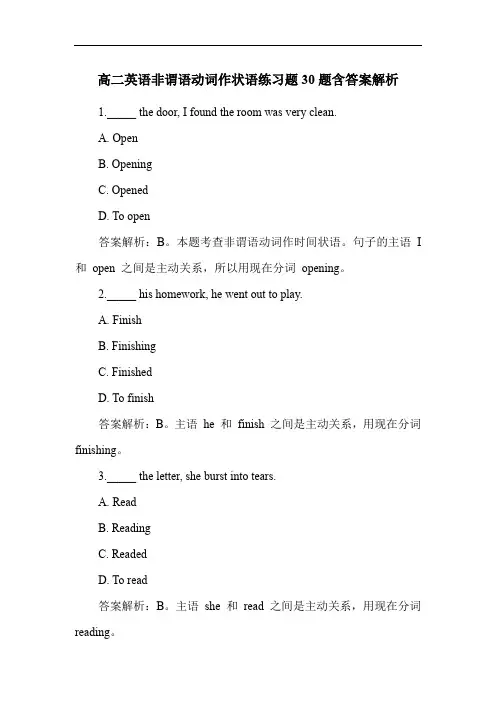
高二英语非谓语动词作状语练习题30题含答案解析1._____ the door, I found the room was very clean.A. OpenB. OpeningC. OpenedD. To open答案解析:B。
本题考查非谓语动词作时间状语。
句子的主语I 和open 之间是主动关系,所以用现在分词opening。
2._____ his homework, he went out to play.A. FinishB. FinishingC. FinishedD. To finish答案解析:B。
主语he 和finish 之间是主动关系,用现在分词finishing。
3._____ the letter, she burst into tears.A. ReadB. ReadingC. ReadedD. To read答案解析:B。
主语she 和read 之间是主动关系,用现在分词reading。
4._____ by the teacher, the students felt very happy.A. PraisedB. PraisingC. PraiseD. To praise答案解析:A。
主语the students 和praise 之间是被动关系,用过去分词praised。
5._____ up early in the morning, he went for a walk.A. GetB. GettingC. GotD. To get答案解析:B。
主语he 和get up 之间是主动关系,用现在分词getting。
6._____ the news, he jumped with joy.A. HearB. HearingC. HeardD. To hear答案解析:B。
主语he 和hear 之间是主动关系,用现在分词hearing。
7._____ the book, I learned a lot.A. ReadB. ReadingC. ReadedD. To read答案解析:B。
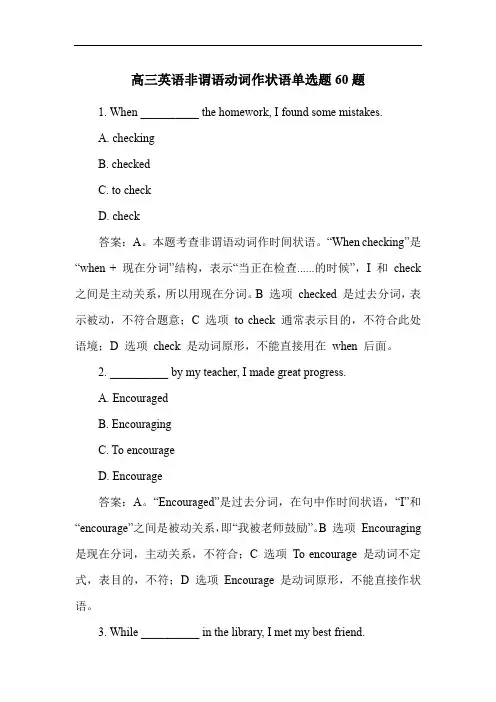
开车安全温馨提示语1. 带一分小心上路,携一团温馨回家。
2. 行车一走神,事故敲你门。
3. 行车勿大意,走路莫心急,心中想安全,幸福永不离。
4. 你不争我不争,交通事故不发生。
5. 交通拥挤莫急躁,各行其道勿干扰,大家共创文明路,平安就是连心桥!6. 宣传交通安全交警苦口婆心,创造文明交通大家谨记在心;行车走路礼让三先万众一心,漫长人生平安是福众皆开心。
7. 足行千里,步步为安!8. 行车在外亲人念,平安归来合家欢。
9. 路路无“违”,天天平安。
10. 来也平安,去也平安,来去平安,父母心安。
11. 脚踏畅通路,时刻平安行,谨记安全法,幸福伴一生。
12. 点点滴滴,安全第一。
13. 没路的时候盼有路,有路的时候盼有车,路也有了车也好了咱盼什么呢?盼文明平安盼和谐幸福!14. 遵规驾驶有速度,珍惜生命是成熟,出入平安是祝福,合家团圆享富足。
15. 开车心头毋通赶,免得吃快弄破碗。
开车安全温馨提示语(二)1. 赠人玫瑰,手留余香,予人礼让,一生平安。
2. 红绿灯下车如潮,安全行驶最重要,彼此礼让守秩序,归途平安阖家笑。
3. 你走,我走,大家走,安全意识心中有;你让,我让,大家让,安全行路有保障。
4. 平安出行每一步,关爱生命每一天;交通安全心中记,幸福生活比蜜甜。
5. 井然有序谋求和谐交通,车水马龙共创平安大道。
6. 交通安全时时不忘,幸福生活天天拥有。
7. 家有老小责任担双肩,路有风雨安全记心间。
8. 交通法规要知晓,出行常伴吉祥鸟!9. 脚下留神,心中留意,慎行每步,安全一生。
10. 一家头顶一个天,一人出车一家牵,一路谨慎一路安,一人安全一家欢。
11. 要让爱车跑,车况要良好;开车别太快,系好安全带;出门要提前,堵车心不烦;行车要礼让,路口多张望;夜行勤变灯,车距要适中;时刻想安全,平安永相伴。
12. 让我们忠诚地守卫交通安全,一天又一天;让我们执著地追逐幸福,一年又一年;温馨是永远的伴侣,平安是共同的心愿。
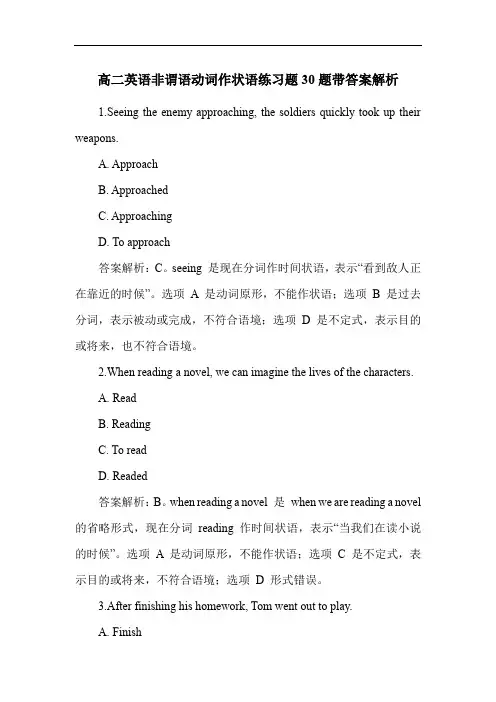
高二英语非谓语动词作状语练习题30题带答案解析1.Seeing the enemy approaching, the soldiers quickly took up their weapons.A. ApproachB. ApproachedC. ApproachingD. To approach答案解析:C。
seeing 是现在分词作时间状语,表示“看到敌人正在靠近的时候”。
选项 A 是动词原形,不能作状语;选项B 是过去分词,表示被动或完成,不符合语境;选项D 是不定式,表示目的或将来,也不符合语境。
2.When reading a novel, we can imagine the lives of the characters.A. ReadB. ReadingC. To readD. Readed答案解析:B。
when reading a novel 是when we are reading a novel 的省略形式,现在分词reading 作时间状语,表示“当我们在读小说的时候”。
选项A 是动词原形,不能作状语;选项C 是不定式,表示目的或将来,不符合语境;选项D 形式错误。
3.After finishing his homework, Tom went out to play.A. FinishB. FinishedC. FinishingD. To finish答案解析:C。
after finishing his homework 是after he finished his homework 的省略形式,现在分词finishing 作时间状语,表示“在完成作业之后”。
选项A 是动词原形,不能作状语;选项B 是过去分词,表示被动或完成,不符合语境;选项D 是不定式,表示目的或将来,不符合语境。
4.Before leaving for school, Mary made sure she had everything she needed.A. LeaveB. LeftC. LeavingD. To leave答案解析:C。
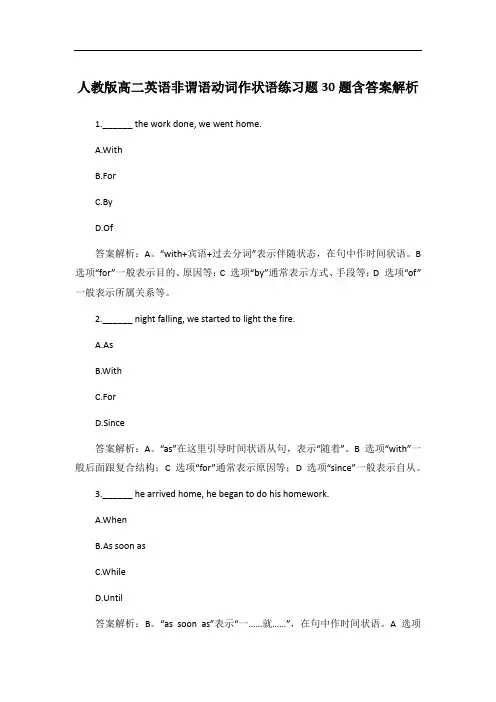
人教版高二英语非谓语动词作状语练习题30题含答案解析1.______ the work done, we went home.A.WithB.ForC.ByD.Of答案解析:A。
“with+宾语+过去分词”表示伴随状态,在句中作时间状语。
B 选项“for”一般表示目的、原因等;C 选项“by”通常表示方式、手段等;D 选项“of”一般表示所属关系等。
2.______ night falling, we started to light the fire.A.AsB.WithC.ForD.Since答案解析:A。
“as”在这里引导时间状语从句,表示“随着”。
B 选项“with”一般后面跟复合结构;C 选项“for”通常表示原因等;D 选项“since”一般表示自从。
3.______ he arrived home, he began to do his homework.A.WhenB.As soon asC.WhileD.Until答案解析:B。
“as soon as”表示“一……就……”,在句中作时间状语。
A 选项“when”表示“当……的时候”,一般强调某个时刻;C 选项“while”强调两个动作同时进行;D 选项“until”表示“直到……才”。
4.______ spring coming on, the trees turn green.A.AsB.WithC.ForD.Since答案解析:A。
“as”引导时间状语从句,表示“随着”。
B 选项“with”一般后面跟复合结构;C 选项“for”一般表示原因等;D 选项“since”一般表示自从。
5.______ he entered the room, he saw his mother.A.As soon asB.WhenC.WhileD.Until答案解析:B。
“when”表示“当……的时候”,在这里强调他进入房间的那个时刻。
A 选项“as soon as”表示“一……就……”;C 选项“while”强调两个动作同时进行;D 选项“until”表示“直到……才”。
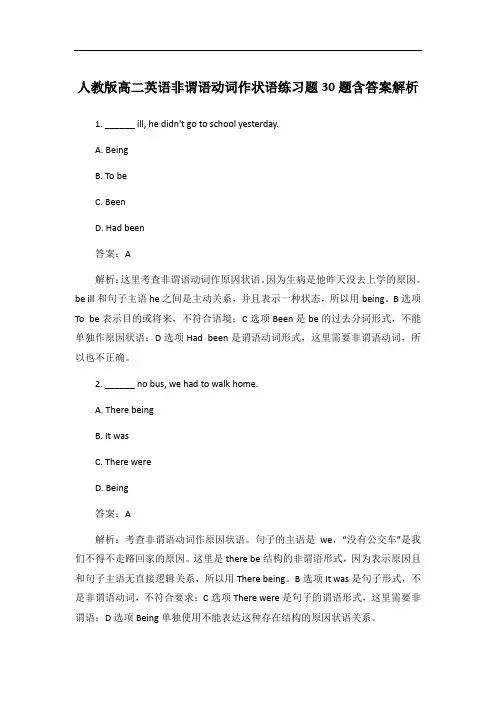
人教版高二英语非谓语动词作状语练习题30题含答案解析1. ______ ill, he didn't go to school yesterday.A. BeingB. To beC. BeenD. Had been答案:A解析:这里考查非谓语动词作原因状语。
因为生病是他昨天没去上学的原因。
be ill和句子主语he之间是主动关系,并且表示一种状态,所以用being。
B选项To be表示目的或将来,不符合语境;C选项Been是be的过去分词形式,不能单独作原因状语;D选项Had been是谓语动词形式,这里需要非谓语动词,所以也不正确。
2. ______ no bus, we had to walk home.A. There beingB. It wasC. There wereD. Being答案:A解析:考查非谓语动词作原因状语。
句子的主语是we,“没有公交车”是我们不得不走路回家的原因。
这里是there be结构的非谓语形式,因为表示原因且和句子主语无直接逻辑关系,所以用There being。
B选项It was是句子形式,不是非谓语动词,不符合要求;C选项There were是句子的谓语形式,这里需要非谓语;D选项Being单独使用不能表达这种存在结构的原因状语关系。
3. ______ not to miss the flight, we arrived at the airport two hours early.A. RemindingB. RemindedC. To remindD. Having reminded答案:B解析:这是考查非谓语动词作原因状语。
句子主语是we,我们被提醒不要错过航班,所以是被动关系。
A选项Reminding是主动形式,不符合;C选项To remind表示目的,不是原因;D选项Having reminded是主动形式的完成式,也不符合。
而B选项Reminded是过去分词形式,表示被动和完成,符合语境。
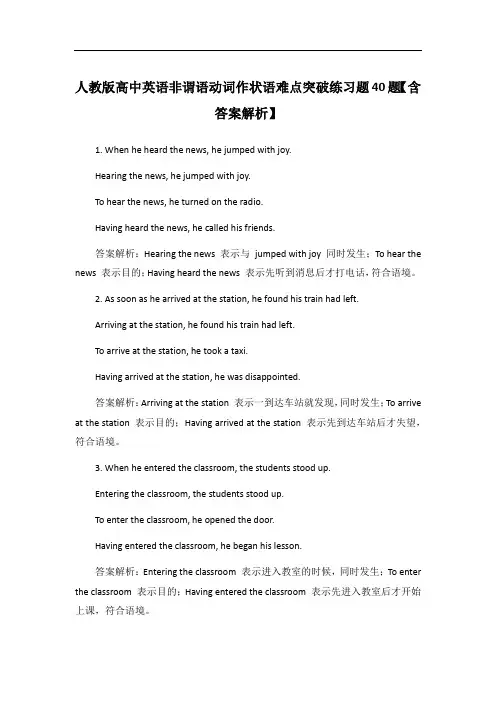
人教版高中英语非谓语动词作状语难点突破练习题40题【含答案解析】1. When he heard the news, he jumped with joy.Hearing the news, he jumped with joy.To hear the news, he turned on the radio.Having heard the news, he called his friends.答案解析:Hearing the news 表示与jumped with joy 同时发生;To hear the news 表示目的;Having heard the news 表示先听到消息后才打电话,符合语境。
2. As soon as he arrived at the station, he found his train had left.Arriving at the station, he found his train had left.To arrive at the station, he took a taxi.Having arrived at the station, he was disappointed.答案解析:Arriving at the station 表示一到达车站就发现,同时发生;To arrive at the station 表示目的;Having arrived at the station 表示先到达车站后才失望,符合语境。
3. When he entered the classroom, the students stood up.Entering the classroom, the students stood up.To enter the classroom, he opened the door.Having entered the classroom, he began his lesson.答案解析:Entering the classroom 表示进入教室的时候,同时发生;To enter the classroom 表示目的;Having entered the classroom 表示先进入教室后才开始上课,符合语境。
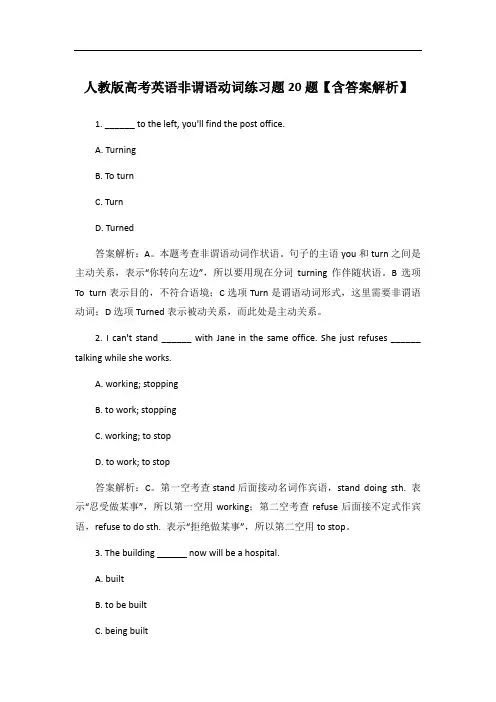
人教版高考英语非谓语动词练习题20题【含答案解析】1. ______ to the left, you'll find the post office.A. TurningB. To turnC. TurnD. Turned答案解析:A。
本题考查非谓语动词作状语。
句子的主语you和turn之间是主动关系,表示“你转向左边”,所以要用现在分词turning作伴随状语。
B选项To turn表示目的,不符合语境;C选项Turn是谓语动词形式,这里需要非谓语动词;D选项Turned表示被动关系,而此处是主动关系。
2. I can't stand ______ with Jane in the same office. She just refuses ______ talking while she works.A. working; stoppingB. to work; stoppingC. working; to stopD. to work; to stop答案解析:C。
第一空考查stand后面接动名词作宾语,stand doing sth. 表示“忍受做某事”,所以第一空用working;第二空考查refuse后面接不定式作宾语,refuse to do sth. 表示“拒绝做某事”,所以第二空用to stop。
3. The building ______ now will be a hospital.A. builtB. to be builtC. being built答案解析:C。
本题考查非谓语动词作定语。
根据句中的now可知,大楼正在被建造,要用现在分词的被动形式being built作定语修饰the building。
A选项built表示已经被建造好的;B选项to be built表示将要被建造;D选项building 形式错误。
4. ______ in the queue for half an hour, Tom suddenly realized that he had left his wallet at home.A. To waitB. Have waitedC. Having waitedD. To have waited答案解析:C。
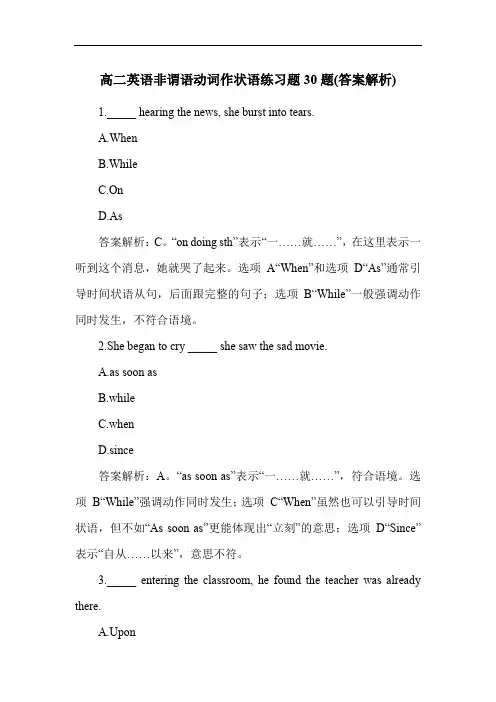
高二英语非谓语动词作状语练习题30题(答案解析)1._____ hearing the news, she burst into tears.A.WhenB.WhileC.OnD.As答案解析:C。
“on doing sth”表示“一……就……”,在这里表示一听到这个消息,她就哭了起来。
选项A“When”和选项D“As”通常引导时间状语从句,后面跟完整的句子;选项B“While”一般强调动作同时发生,不符合语境。
2.She began to cry _____ she saw the sad movie.A.as soon asB.whileC.whenD.since答案解析:A。
“as soon as”表示“一……就……”,符合语境。
选项B“While”强调动作同时发生;选项C“When”虽然也可以引导时间状语,但不如“As soon as”更能体现出“立刻”的意思;选项D“Since”表示“自从……以来”,意思不符。
3._____ entering the classroom, he found the teacher was already there.A.UponB.AsC.WhenD.While答案解析:A。
“upon doing sth”表示“一……就……”。
选项B“As”和选项C“When”后面跟完整句子;选项D“While”强调动作同时发生。
4.He started to run _____ the bell rang.A.as soon asB.whileC.whenD.since答案解析:A。
“as soon as”一……就……,符合语境。
选项B“While”强调同时发生;选项C“When”虽然可以引导时间状语,但不如“As soon as”直接;选项D“Since”表示自从,意思不符。
5._____ he arrived home, he began to do his homework.A.As soon asB.WhileC.WhenD.Since答案解析:A。
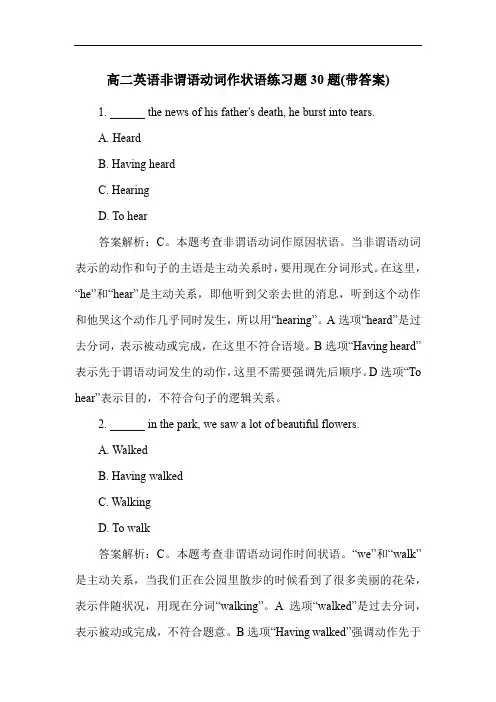
高二英语非谓语动词作状语练习题30题(带答案)1. ______ the news of his father's death, he burst into tears.A. HeardB. Having heardC. HearingD. To hear答案解析:C。
本题考查非谓语动词作原因状语。
当非谓语动词表示的动作和句子的主语是主动关系时,要用现在分词形式。
在这里,“he”和“hear”是主动关系,即他听到父亲去世的消息,听到这个动作和他哭这个动作几乎同时发生,所以用“hearing”。
A选项“heard”是过去分词,表示被动或完成,在这里不符合语境。
B选项“Having heard”表示先于谓语动词发生的动作,这里不需要强调先后顺序。
D选项“To hear”表示目的,不符合句子的逻辑关系。
2. ______ in the park, we saw a lot of beautiful flowers.A. WalkedB. Having walkedC. WalkingD. To walk答案解析:C。
本题考查非谓语动词作时间状语。
“we”和“walk”是主动关系,当我们正在公园里散步的时候看到了很多美丽的花朵,表示伴随状况,用现在分词“walking”。
A选项“walked”是过去分词,表示被动或完成,不符合题意。
B选项“Having walked”强调动作先于谓语动词发生,这里不需要这种先后顺序。
D选项“To walk”表示目的,不符合句子逻辑。
3. ______ for a long time, the boy felt very tired.A. StandingB. Having stoodC. StoodD. To stand答案解析:A。
本题考查非谓语动词作原因状语。
“the boy”和“stand”是主动关系,因为站了很长时间,所以男孩感觉很累,这里表示原因,同时表示动作正在进行,用“Standing”。
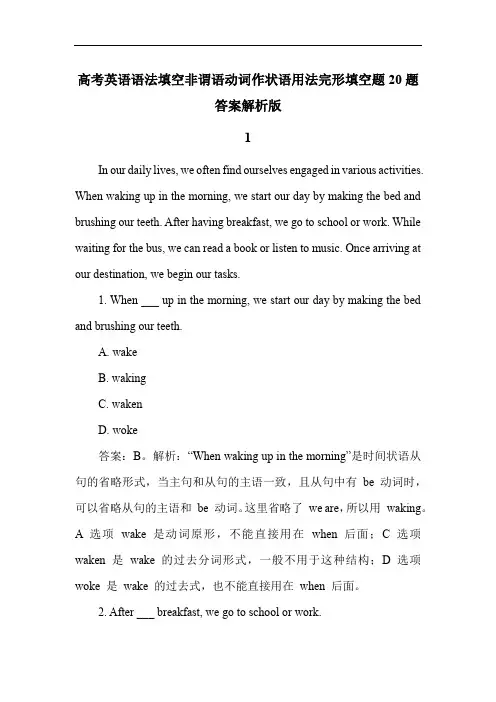
高考英语语法填空非谓语动词作状语用法完形填空题20题答案解析版1In our daily lives, we often find ourselves engaged in various activities. When waking up in the morning, we start our day by making the bed and brushing our teeth. After having breakfast, we go to school or work. While waiting for the bus, we can read a book or listen to music. Once arriving at our destination, we begin our tasks.1. When ___ up in the morning, we start our day by making the bed and brushing our teeth.A. wakeB. wakingC. wakenD. woke答案:B。
解析:“When waking up in the morning”是时间状语从句的省略形式,当主句和从句的主语一致,且从句中有be 动词时,可以省略从句的主语和be 动词。
这里省略了we are,所以用waking。
A 选项wake 是动词原形,不能直接用在when 后面;C 选项waken 是wake 的过去分词形式,一般不用于这种结构;D 选项woke 是wake 的过去式,也不能直接用在when 后面。
2. After ___ breakfast, we go to school or work.B. havingC. hadD. to have答案:B。
解析:“After having breakfast”是介词after 后面跟动名词作宾语。
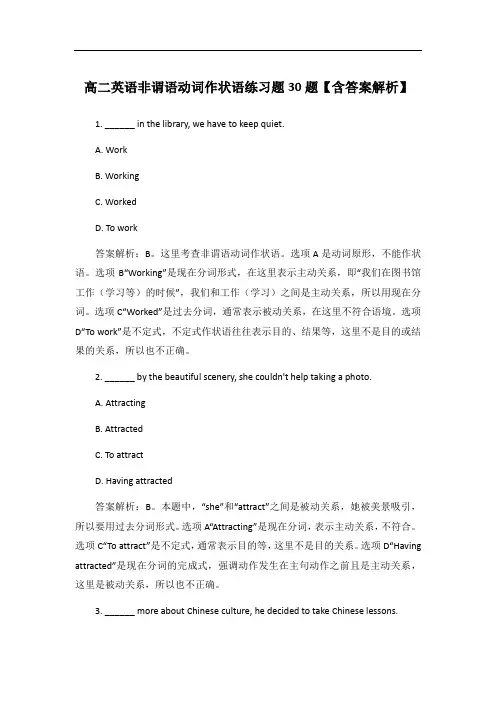
高二英语非谓语动词作状语练习题30题【含答案解析】1. ______ in the library, we have to keep quiet.A. WorkB. WorkingC. WorkedD. To work答案解析:B。
这里考查非谓语动词作状语。
选项A是动词原形,不能作状语。
选项B“Working”是现在分词形式,在这里表示主动关系,即“我们在图书馆工作(学习等)的时候”,我们和工作(学习)之间是主动关系,所以用现在分词。
选项C“Worked”是过去分词,通常表示被动关系,在这里不符合语境。
选项D“To work”是不定式,不定式作状语往往表示目的、结果等,这里不是目的或结果的关系,所以也不正确。
2. ______ by the beautiful scenery, she couldn't help taking a photo.A. AttractingB. AttractedC. To attractD. Having attracted答案解析:B。
本题中,“she”和“attract”之间是被动关系,她被美景吸引,所以要用过去分词形式。
选项A“Attracting”是现在分词,表示主动关系,不符合。
选项C“To attract”是不定式,通常表示目的等,这里不是目的关系。
选项D“Having attracted”是现在分词的完成式,强调动作发生在主句动作之前且是主动关系,这里是被动关系,所以也不正确。
3. ______ more about Chinese culture, he decided to take Chinese lessons.A. LearnB. LearnedC. To learnD. Learning答案解析:C。
这里考查不定式作状语表示目的。
他决定上中文课的目的是更多地了解中国文化。
选项A是动词原形,不能作状语。
选项B“Learned”是过去分词,不符合这里表示目的的语境。
高中英语状语从句100练(含答案)高中英语题目一、单选题。
(共99题, 每题1分, 共99分)1.In peace, too, the Red Cross is expected to send help ________ there is human suffering.A. whoeverB. howeverC. whateverD. wherever2.—Bob, look what you have done! You ruined the experiment.—It’s not my fault.I just carried out the instructions _____.A. as toldB. as telling meC. as tellingD. as I told3.____I see her,I will find some changes in her.A,As soon as B,Every time C,The moment D,The first time4.Much ____ he has a good taste for China’s Football Matches, he can’t avoid being influenced by the side effects of the football gambling.A. that he claimsB. does he claimC. it is that he claimsD. as he claims5. If you _____ his wife’s income____ his own, the total of their income _____ 3000 yuan.A. add; to; will add up toB. add; to; adds toC. add up; to; adds up toD. will add; for; adds up6.-Look at those clouds!Don't worry.______ it rains, we'll still have a great time.A. Even ifB. As thoughC. In caseD. If only7、_________ you may have, you should gather your courage to face the challenge.A. However a serious problemB. What a serious problemC. However serious a problemD. What serious a problem8、________the American economy expanded at an annual rate of 2.5 percent in July—September, it faced a long road to recovery.A. SinceB. IfC. WhileD. When9、Please come to visit me if _________________.A. you are convenientB. it is convenient of youC. you are for convenienceD. it is convenient for you10、The famous scientist grow up________ he was born and in 1930 he came to Shanghai.A. whenB. in whichC. whereD. wherever11.___ , he still put people’s life in the first place.A. However he was tiredB. Now matter he was tiredC. Now matter how was he tiredD. However tired he was12.I have been keeping the portrait _____ I can see it every day, as it always reminds me of my childhood in Paris.A. sinceB. whereC. asD. if13.—Don’t look down upon Bob.He has his own advantages.—Oh, yes. others are weak, he is strong.A. IfB. WhereC. WhenD. Though14.It’s such a good place___ everyone wants to go and visit ___ it is well-known all over the world.A. that; thatB. as; asC. as; thatD. that; as15.This is my own restaurant.You can come to eat here ____ you like.A. whereverB. whateverC. whicheverD. whenever16.He is rather difficult to make friends with, but his friendship, _____ is more true than anyone else’s.A. Once gainingB. Once gainedC. Once is gainingD. Once he gained17、_____unemployment and crime are high, it can be assumed that the latter is due to the former.A. BeforeB. WhereC. UnlessD. Until18、Jack wasn't allowed to go into the sports club ______ he left his membership card at home.A. thoughB. asC. beforeD. Until19、 _________ you may have, you should gather your courage to face the challenge.A. Whatever serious a problemB. However serious a problemC. However a serious problemD. No matter how a serious problem20、All the soldiers were placed exactly the local government wanted them for the control of the comeback of the flood.A. whileB. whenC. whereD. though21.We climbed higher _____ we might see the scenes better.A. sothatB. even thoughC. in caseD. as if22.Would you please put the dictionary it belongs?A. whereB. to whichC. to whomD. what23.The people in the disaster areas are ready to accept _______ help they can get.A. whicheverB. howeverC. whateverD. whenever24. --- Don’t look down upon Bob.He has his own advantages.----Oh, yes.______ others are weak, he is strong.A. IfB. WhereC. WhenD. Though25.(2014·江苏四校第四次考试)I can not understand why the issue of Syria has become so complicated________I learn more from the media.A. afterB. beforeC. whileD. when26.He never speaks to others until ______.A. he speaksB. spoken toC. he is spokenD. he speaks to27、You should report any incident, _______ minor it is.A. whateverB. wheneverC. howeverD. wherever28、---- Did he come back early last night?---- Yes.It was not yet eight o’clock _______ he arrived home.A. whenB. thatC. beforeD. until29、 Everything was placed exactly ___________he wanted it for the graduation ceremony.A. whileB. whenC. whereD. though30、This is a very cute dog.I’ll take it, .A.how much may it cost B.how much it may cost.C. however much it may costD. no matter how it may cost31.He tried his best to solve the problem, difficult it was.A. no matter whatB. whateverC. howeverD. how32.My parents have promised to come to see me before I ______ for Africa.A. have leftB. leaveC. leftD. will leave33.Peter was so excited __________ he received an invitation from his friend to visit them.A. whereB. thatC. whyD. when34._______, you will get used to the life here and have your understanding of life.A. As time going byB. With time passing outC. As time goes byD. With time goes by35. in Super Girls that Duan Linxi became known to almost all teenagers.A. So successful her performance wasB. So successful was her performanceC. So her performance was successfulD. So was her successful performance36.I lost sight of Wang Ping when we reached _____ looked like a large market because of too many carriages flying by in all directions.A. thatB. whatC. whereD. which37、______ this village was extremely poor, they felt it was still important to keep the school going.A. So long asB. ThoughC. Even asD. As if38、How did you manage to get to the school on time_________you missed the schoolbus?A. whenB. ifC. onceD. because39、--- Have you told Joan the bad news that her grandfather fell off the bike and hurt seriously?--- Yes.I told her ________I saw her this afternoon.A. whileB. the momentC. untilD. Suddenly40、____, as long as I’m with nature, I don’t care.A. However tough the journey isB. Whatever tough the journey isC. However the journey is toughD. Whatever the journey is tough41.42.The little boy who got lost decided to remain ________ she was and wait for her mother.A. whatB. howC. whoD. where43.Once ____ in the forest, you ought to remain ____ you are waiting for help.A. losing; whereB. losing; thereC. lost; thereD. lost; where44. I _______ to the party if I________tomorrow.A. will go; will be invitedB. will go; am invitedC. go; will inviteD. go, have been invited45.It will really make no difference ________ he doesn’t come tonight.A. ifB. whetherC. thatD. what46. In my opinion, we need to begin ______ we stopped yesterday to ensure we won’tmiss anything.A. whenB. whereC. howD. what47、(2013·北京, 30)I took my driving license with me on holiday, ________I wanted to hire a car.A. in caseB. even ifC. ever sinceD. if only48、_____he entered the room,he picked up the phone and told the news to his parents.A,At the moment B,Hardly C,The moment D,No soon49、_____________grades you get in this exam, you should never lose heart.A. No matter howB. WhatC. No matter whatD. Which50、—____________ difficulty you meet, remember that it might just be a touchstone. —You are right.__________ difficult it is, we will never give in.A. However; whateverB. However; howeverC. Whatever; whateverD. Whatever; however51. ______ you may have , you should gather your courage to face the challenge .A. However serious a problemB. Whatever serious a problemC. However a serious problemD. No matter how a serious problem52.—What should I wear to attend his wedding party?—Dress ____ you like.A. whatB. howeverC. whateverD. how53.I don't believe we've met before, I must say you do look familiar.A. thereforeB. althoughC. sinceD. unless54.55.John thought it wouldn’t be long he was ready for his new job.A. sinceB. whenC. beforeD. after56. It was _____that we went camping on the mountain.A. such nice weatherB. so nice a weatherC. such a nice weatherD. too nice weather57、 Everything was placed exactly _______ he wanted it for the graduation ceremony.A. thoughB. whereC. whileD. when58、They promised to develop a software package by the end of this year, ________ they might have.A. however difficultB. how difficultC. whatever difficultyD. what difficulty59、--- Did Peter come back early last night?--- Yes.It was not yet eight o’clock _________ he arrived home.A. whenB. thatC. untilD. before60、The big secret in life is that there is no big secret.__________ your goal, you can get there if you’re willing to work.A. HoweverB. WhicheverC. WhereverD. Whatever61. you may have, you should gather your courage to face the challenge.A. However a serious problemB. What a serious problemC. However serious a problemD. What serious a problem62. Please arrange an interview with the manager tomorrow , or it is convenient to him .A. wheneverB. howeverC. whicheverD. wherever63.Nowadays workers are earning per month as they did in the 1990s.A. twice as much asB. as twice as muchC. as much twice asD. twice as much64.Hot _______the night air was, we slept deeply because we were so tired after the long journey.A. althoughB. asC. whileD. however65.– Didn’t you tell Harry not to play games so much?–I said to him goes in one ear and out the other.A. No matter howB. HoweverC. No matter whatD. Whatever66.After the war, a new school building was put up ______there had once been a theatre.A. whenB. in whichC. the place whereD. where67、 Here we have beef, fish and fruit.Help yourself to ______ you like.A. whicheverB. howeverC. whateverD. whenever68、If someone falls off the ladder and gets seriously hurt, you’d better leave him_____ he falls and try to get help.A. beforeB. whenC. whereD. what69、—Have you known each other for long?—Not very long, we started to work in the company.A. afterB. beforeC. whenD. since70、It’s the second time ___ I’ve read an English novel.But do you know there was a time ___I hated English?A. that; thatB. when; thatC. that; whenD. when; when71.________ your composition carefully, some spelling mistakes can be avoided.A. Having checkedB. CheckingC. If you checkD. To check72.—Where did you lose your bicycle?—It was in the playground______I played basketball.A. thatB. whereC. whichD. when73.Every evening after dinner, if not from work,, I will spend some time walking my dog.A. being tiredB. tiringC. tiredD. to be tired74.A serious illness, ______ its nature, is almost always painful.A. whateverB. whereverC. wheneverD. however75.Every evening after dinner, if not ___________ from work, I will spend some time walking my dog.A. being tiredB. tiringC. to be tiredD. tired76.House prices vary from place to place and are usually high ____ there are famous schools.A. sinceB. whenC. whetherD. where77、No matter ______ the CRH accident in Wenzhou, it had and will have much warning significance.A. how the investigators said causedB. what the investigators said causedC. why the investigators said causedD. the investigators said how caused78、The famous scientist grew up _______ he was born and in 1950 he came to Nanjing .A. WhenB. wheneverC. whereD. wherever79、It’s such a good place___ everyone wants to go and visit ___ it is well-known all over the world.A. that; thatB. as; asC. as; thatD. that; as80、_______ this sentence a second time, the meaning will become clear to you.A. If readingB. When you readC. ReadingD. Read81.______ we think of Ben, we have to admit that he is a highly competent man.A. HoweverB. WhetherC. WhicheverD. Whatever82.No matter how________, it is not necessarily lifeless.A. dry a desert may beB. a desert may be dryC. may a desert be dryD. dry may a desert be83. I’ll go to the party with you ________ you don’t wear those strange trousers.A. as thoughB. in order thatC. in thatD. providing84.You should report any incident, ______ minor it is.A. whateverB. wheneverC. howeverD. wherever85._________, I always feel I want a few more days.A. However long is a vacationB. However long a vacation isC. However is a vacation longD. However a vacation is long86.When ______ if he had any idea of what the novel was about, Jack just kept silent.A. askingB. askedC. to askD. being asked87、Cold ______ the night air was, he slept soundly because he was so tired after working for a whole day.A. althoughB. whileC. howeverD. as88、The little boy who got lost decided to remain ________ she was and wait for her mother.A. whatB. howC. whoD. where89、______ around the Water Cube , we were taken to see the Bird’s Nest for the 2008 Olympic Games.A. Having shownB. To be shownC. Having been shownD. To show90、Every evening after dinner, if not ______ in reading books, she can be found _____ on the sofa watching TV.A. absorbed; seatingB. absorbing; satC. absorbed; seatedD. absorbing; sitting91. Children should be instructed to put things they belong in their early childhood.A. whereB. in whichC. to whichD. what92. When ______ help, one often says “Thank you.” or “It’s kind of you.”A. offeringB. to offerC. to be offeredD. offered93.______ advice I give him , he just does not listen.A. HoweverB. No matter howC. No matterD. Whatever94.The lawyer seldom wears anything other than a suit _____ the season.A. whateverB. whereverC. wheneverD. however95. His idea was such a good one ______ we all agreed to use it.A. asB. thatC. soD. but96.John shut everybody out of the kitchen ________ he could prepare his grand surprise for the party.A. whichB. whenC. so thatD. as if97、If you visit our home or ring the doorbell, you by our dog.A. were greetedB. will greetC. will be greetedD. greeted98、Though ______ to see us, the professor gave us a warm welcome.A. surprisedB. was surprisedC. surpriseD. being surprised99、. _______ we can afford it, we wouldn’t go abroad for our vacation.A. As long asB. WheneverC. Even thoughD. In case1.答案: D2.答案: A试题分析: 考查状语从句的省略。
高二英语非谓语动词作状语练习题30题(答案解析)1._____ the homework, he went out to play.A.FinishedB.Having finishedC.FinishingD.To finish答案解析:B。
A 选项Finished 表示被动,与主语he 之间逻辑关系不对。
C 选项Finishing 表示动作正在进行,此处“完成作业”这个动作应在“出去玩”之前,所以不合适。
D 选项To finish 表示目的,不符合语境。
B 选项Having finished 是现在分词的完成式,表示动作先于谓语动词发生,符合题意。
2.When _____ his homework, he found some mistakes.A.checkingB.checkedC.to checkD.check答案解析:A。
B 选项checked 表示被动,与主语he 之间逻辑关系不对。
C 选项to check 表示目的,此处不是目的关系。
D 选项check 形式错误。
A 选项checking 现在分词表示主动,与主语he 是主动关系,且表示正在进行的动作,符合语境。
3._____ by his teacher, he realized his mistake.A.ScoldedB.Having scoldedC.Being scoldedD.Scolding答案解析:C。
A 选项Scolded 表示被动,但不能体现动作正在进行。
B 选项Having scolded 表示主动,与主语逻辑关系错误。
D 选项Scolding 表示主动,与主语逻辑关系错误。
C 选项Being scolded 是现在分词的被动式,表示正在被批评,符合语境。
4.After _____ the book, he understood the story better.A.readingB.readC.to readD.being read答案解析:A。
高中英语非谓语动词作状语难点突破练习题50题答案解析版1. Seeing the teacher coming, the students stood up.A. SeenB. SeeingC. To seeD. See答案解析:B。
“Seeing the teacher coming”在句中作时间状语,表示“看到老师走过来的时候”。
现在分词seeing 与主语the students 是主动关系,且动作同时发生。
A 选项seen 是过去分词,表示被动关系,不符合语境;C 选项to see 表目的,不是时间状语;D 选项see 是动词原形,不能作状语。
2. Having finished his homework, he went out to play.A. FinishedB. Having finishedC. To finishD. Finish答案解析:B。
“Having finished his homework”作时间状语,表示“完成作业之后”。
现在分词的完成式having finished 与主语he 是主动关系,且finish 的动作发生在went out 的动作之前。
A 选项finished 是过去分词,被动关系错误;C 选项to finish 表目的,不是时间状语;D 选项finish 是动词原形,不能作状语。
3. When asked about his plan, he remained silent.A. AskingB. AskedC. To askD. Ask答案解析:B。
“Asked about his plan”在句中作时间状语,表示“当被问到他的计划时”。
过去分词asked 与主语he 是被动关系。
A 选项asking 是主动关系错误;C 选项to ask 表目的,不是时间状语;D 选项ask 是动词原形,不能作状语。
4. Hearing the news, she burst into tears.A. HeardB. HearingC. To hearD. Hear答案解析:B。
人教版高考英语语法填空非谓语动词作状语用法练习题40题含答案解析1. ______ (see) from the top of the mountain, the city looks beautiful.A. SeeB. SeeingC. SeenD. To see答案:C。
解析:此句中,逻辑主语是the city,城市是被看的,所以要用过去分词seen作状语,表示被动关系。
2. ______ (finish) his homework, Tom went out to play.A. FinishB. FinishingC. FinishedD. To finish答案:B。
解析:逻辑主语Tom和finish之间是主动关系,且finish这个动作发生在went out之前,所以用现在分词finishing作状语,表示主动和完成。
3. ______ (not know) how to get there, I had to ask the police for help.A. Not knowB. Not knowingC. Not knownD. To not know答案:B。
解析:逻辑主语I和know之间是主动关系,这里表示原因,不知道怎么去那里,所以用现在分词not knowing作状语。
4. The old man sat in his chair, ______ (read) a newspaper.A. readB. readingC. readedD. to read答案:B。
解析:逻辑主语the old man和read之间是主动关系,且read这个动作和sat同时发生,所以用现在分词reading作状语,表示伴随。
5. ______ (save) money, she bought less clothes.A. SaveB. SavingC. SavedD. To save答案:D。
高中英语非谓语动词形式练习题30题(答案解析)1.She loves reading novels,_____ her knowledge and imagination.A.expandingB.to expandC.expandedD.being expanded答案解析:B。
本题考查非谓语动词作目的状语。
A 项expanding 表示主动进行;C 项expanded 表示被动完成;D 项being expanded 表示正在被进行,都不符合题意。
这里用to expand 表示目的,她喜欢读小说是为了拓展她的知识和想象力。
2._____ good grades, he studies hard every day.A.To getB.GettingC.GotD.Get答案解析:A。
本题考查非谓语动词作目的状语。
B 项Getting 表示主动进行;C 项Got 表示被动完成;D 项Get 是动词原形,不能作非谓语。
这里用To get 表示目的,为了取得好成绩,他每天努力学习。
3.He enjoys_____ basketball after school.A.playingB.to playD.play答案解析:A。
本题考查非谓语动词作宾语。
enjoy 后面接动词的-ing 形式,enjoy doing sth.表示喜欢做某事。
4.She is considering_____ a new hobby.A.taking upB.to take upC.taken upD.take up答案解析:A。
本题考查非谓语动词作宾语。
consider 后面接动词的-ing 形式,consider doing sth.表示考虑做某事。
5.The students are looking forward to_____ the exam.A.finishingB.to finishC.finishedD.finish答案解析:A。
人教版高二英语非谓语动词作状语练习题30题含答案解析1. ______ more about Chinese culture, Jack has decided to take Chinese folk music as an elective course.A. LearnB. LearnedC. To learnD. To be learning答案:C解析:本题考查非谓语动词作目的状语。
句意为为了更多地了解中国文化,杰克决定选修中国民间音乐。
这里用不定式To learn表示目的,A选项是动词原形,不能作状语;B选项Learned表示被动或完成,不符合语境;D选项To be learning是不定式的进行式,在此处不需要表示进行的意义,所以C正确。
2. ______ in the poorest area of Glasgow, he had a long, hard road to becoming a football star.A. Being raisedB. RaisingC. RaisedD. To raise答案:C解析:本题考查非谓语动词作原因状语。
句子的主语he和raise (养育)之间是被动关系,即他被养育在格拉斯哥最贫穷的地区,所以要用过去分词Raised。
A选项Being raised虽然也是被动,但强调正在被养育的动作过程,不符合语境;B选项Raising是现在分词,表示主动,不符合逻辑;D选项To raise是不定式,表示目的或将来,与句子逻辑不符。
3. ______ the early flight, we ordered a taxi in advance and got up very early.A. CatchingB. CaughtC. To catchD. Catch答案:C解析:本题考查非谓语动词作目的状语。
为了赶上早班飞机,我们提前订了出租车并且起得很早。
高中英语非谓语动词、状语从句测试题1. ________ a language requires time and effort.A. LearnB. LearningC. To learnD. Being learned2. It is not always easy ________ invitations.A. to refuseB. refusingC. to be refusedD. being refused3. How __________ the problem will be discussed attomorrow’s meeting.A. to solveB. to be solvedC. being solvedD. solving4. It __________ forty-five minutes __________ there by bus.A. cost, to getB. takes, gettingC. takes, to getD. takes, to get to5. It is no good __________. You should give_________.A. to smoke, it upB. smoking, it upC. smoking, up itD. to smoke, up it6. He gave us some advice on how ____ English.A. learningB. LearnedC. to learnD. learn7. It ’s a pay day, and they are waiting ____.A. payB. payingC. paidD. to be paid8. I don’t know whether you happen, but I’m going to study in the U.S.A this September .A.to be heard B. to be hearingC.to hear D. to have heard9. I forgot _____ my name when I finished ____ the composition.A. to sign, to writingB. to sign, writingC. signing, writing10. ---You were brave enough to raised objections at the meeting.---Well, now I regret ____ that.A. to doB. to be doingC. to have doneD. having done11. She can’t help ____ the house because she’s busy making a cake.A. to cleanB. cleaningC. cleanedD. being cleaned12. Her wish is __________ an engineer.A. becomingB. becomeC. to becomeD. being come13.Some people’s greatest pleasure is __________.A. fishingB. to fishC. to be fishingD. being fish14. The report was so _______ that they were all __________.A. inspiring, excitingB. inspiring, excitedC. inspired, excitedD. inspired, exciting15. ---“You look pale.”---“I feel a little __________.”A. tireB. tiredC. tiringD. tiresome16. She said she had an important meeting ______.A. to attend inB. to attendC. attendD. attending17. He is always the first ______ questions.A. to answerB. answeringC. to be answeredD. being answered18. The Olympic Games _______ in the year 2012 was a great success.A. being heldB. to be heldC. heldD. to hold19. The first textbooks ____ for teaching English as a foreign language came out inthe 16th century.A. having writtenB. to be writtenC. being writtenD. Written20. At present, English is the main subject ___________ here.A. to be taughtB. being taughtC. teachingD. to be teaching21. ---"Who are those people with the banner?"---"A group _______ itself the League for peace."A. callingB. callsC. calledD. is called22. The pen __________ belongs to me.A. which it is on the tableB. lying on the tableC. is on the tableD. which on the table23. The doctor advised Lao Li __________ more rest.A. that he getB. to getC. would getD. get24. Soon they saw the boy _________ in the crowd.A. disappearB. to disappearC. disappearsD. disappeared25. Birds are seldom heard __________ at night.A. singB. singingC. to singD. to be singing26. He kept me __________ for many hours.A. to waitB. having been waitedC. waitingD. waited27. Mother caught the boy __________ in the corner.A. smokeB. to smokeC. smokingD. being smoked28. Having read the Emperor's New Clothes, we all found it ___.A. interestB. interestedC. interestingD. to interest29. I need this chapter __________ before tomorrow.A. rewritingB. rewrittenC. rewriteD. to write again30. When she returned home, she found the window open and something__________.A. to stealB. losingC. missedD. stolen31. There was so much noise that the speaker could not make himself _________.A. being heardB. heardC. hearingD. Hear32. I have enjoyed my visit here. I'll be very sorry __________.A. for leavingB. of leavingC. to leaveD. left33. I went to see him __________ him out.A. findingB. findC. only to findD. only found34. __________ the cry for help, people immediately rushed out of the rooms.A. To hearB. HearingC. Having heardD. They hearing35. __________ Hello, he reached out his hand.A. SaidB. SayingC. Talked aboutD. Talking to36.. _________ from the tallest building, the whole city looks very beautiful.A. SeeB. SawC. SeeingD. Seen37.. ___________ the past, our life is much better.A. Comparing withB. Be compared withC. To compare withD. Compared with38. I was so familiar with him that I recognized his voice ______ I picked up thephone.A.whileB. AfterC. In caseD. the minute39. How long do you think it will take _______ our product becomes popular with theconsumers?A. whenB. UntilC. beforeD. since40. ______ the day went on, the weather got worse.A.WithB. sinceC. AsD. While41. He was halfway through his meal ____ a familiar voice came to his ears.A.whyB. whereC. whenD. while42. Hardly ______ into the village ______ it began to rain.A.we had got; whenB. we got; thanC. had we got; whenD. did we get43.When he reads a book, his habit is to make a mark _______ the meaning is unclear to him.A. thereB. whereverC. the placeD. in which44. If you are travelling ______ the customs are totally different from your own, youmay feel a cultural shock.A. in the placeB. WhichC. in whichD. where45.Jenny was very sad over the loss of the photos she had shot at Canada, ______ this was a memory she especially treasured.A. asB. ifC. whenD. where46. Some people believe that ______ oil is running out, the fate of the motor industryis uncertain.A. /B. thoughC. forD. since47. We will be able to get there on time, _____ our car doesn’t break down on theroad.A.as soon asB. as far asC. as long asD. as well as48. In time of serious accidents, _____ we know some basic things about first aid, wecan save lives.A.whetherB. UntilC. ifD. Unless49. ______ you have tried it, you can’t imagine how pleasant it is.A. UnlessB. BecauseC. AlthoughD. When50. The official soon realized that, ______, things would get worse.A.unless dealt with properlyB.if not properly dealing with itC.unless properly dealt withD.if dealt not properly with51.______ I accept that he is not perfect, I do actually like the person.A.BeforeB. sinceC. BeforeD. Unless52. The workers are determined to go through with their railway project, ____ theexpenses have risen.A. as long asB. even thoughC. now thatD. as though53. ______, he knows more than other children of his age.A. However young child he isB. Child as he isC. No matter how young child isD. What a young child he is54. I really want the match, however much ______.A. does it costB. costs itC. will it costD. it costs55. ______ we have finished the course, we shall start doing more revision work.A.For nowB. Now thatC. By nowD. until56. ______, the idea off having to work under a woman defeated him.A.Wanting the job very muchB.Although wanting the job badlyC. Though he wanted the job very muchD.He wanted the job badly57.Roses need special care ______ they can live through winter.A.becauseB. so thatC. even ifD. as58. If things are left ______ they are, the problems will never be settled, I’m afraid.A.howB. asC. whatD. where59. Careful surveys have pointed out that as many as 50 percent of the patients do nottake drugs _____ directed.A.likeB. soC. whichD. as60. I dare not go there ______ my parents will see me.A.in case ofB. for fear ofC. in order thatD. for fear that61. When he was a boy, he used to go there and watch _____.A. to repair bicyclesB. bicycles to be repairedC. bicycles being repairedD. repairing bicycles62. --- Have you considered _____ your job as a teacher?--- Yes. I like the job because a teacher is often considered _____ a gardener.A. to change; to beB. to change; beingC. changing; beingD. changing; to be63. The dog, _____, will be made a good watchdog.A. to train properlyB. being trained properlyC. properly to trainD. trained properly64. _____ the diamond, he had to look for a place to hide it.A. Having stolenB. Having been stolenC. StolenD. Stealing65. _____ the front door _____, he had to enter the room through the back door.A. Seen; paintedB. Seeing; paintedC. Being seen; being paintedD. Seeing; being painted66. And there, almost _____ in the big chair, sat her little brother, who never had to be told to keep quiet.A. having lostB. losingC. to be lostD. lost67. He looked around and caught a man _____ his hand into the pocket of a passenger.A. putB. to be puttingC. to putD. putting68. To answer correctly is more important than _____.A. that you finish quicklyB. finishing quicklyC. to finish quicklyD. finish quickly69. The old farmer, _____ the badly injured and burnt soldier, came out of the burning farmhouse, calling continuously for help.A. supportingB. having supportedC. being supported byD. being supported70. In January , 2004, the United States successfully launched “Spirit”, a MarsExploration Rover, _____ a new milestone in the history of mankind.A. it markedB. markingC. markedD. to mark71. It was getting dark; I found a car _____ in a pool by the side of the road.A. to be stuckB. stuckC. stickingD. stick72. You can’t imagine what great trouble they ha ve _____ the problem _____.A. to solve; being talked aboutB. solving; discussingC. to solve; to talk aboutD. solving; being discussed73. The monument was built in honor of the explorer who was believed _____ theriver.A. to have discoveredB. to have been discoveredC. to discoverD. having been discovered74. The thief fell to the ground, his left foot _____ and blood _____ down from hismouth.A. breaking; runningB. broken; runningC. breaking; runD. broken; run75. The program was so exciting that the children kept their eyes _____ on the screen.A. to fixB. to be fixedC. fixedD. fixing76. As I will be away for a t least a year, I’d appreciate _____ from you now and thenso that I can know how everyone is getting along.A. having heardB. to hearC. hearingD. being heard77. _____, the subject was always in my mind.A. Walking or sleepingB. Walking or sleptC. Having walked or sleptD. To walk and sleep78. --- Did you get a dictionary?--- No, I _____, but there were not any _____.A. tried; to be leftB. had tried to; leavingC. tried to; leftD. had tried; have left79. When he came to, he found himself _____ on a chair, with his hands _____ back.A. to sit; tyingB. sitting; tyingC. seating; tiedD. seated; tied80. The joke told by Tom made us _____, so the teacher couldn’t make himself_____.A. to laugh; hearingB. laughing; heardC. laughing; hearD. laughed; heard。